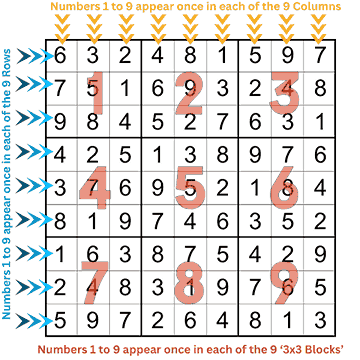Table of Contents
- Introduction
- Why Mental Stimulation Matters as You Age
- The Brain Needs Exercise Too
- The Link Between Puzzles and Cognitive Health
- Sudoku: The Perfect Brain Workout for Seniors
- Easy to Learn, Fun to Play
- Boosts Memory and Concentration
- Reduces Stress and Enhances Relaxation
- How to Get Started with Sudoku
- Pick the Right Difficulty Level
- Use Pen and Paper or Go Digital
- Make It a Daily Habit
- Tips for Solving Sudoku Efficiently
- Conclusion: A Simple Puzzle for a Sharper Mind
- FAQ Section
1. Introduction
Retirement is your golden opportunity to embrace new hobbies, stay mentally engaged, and most importantly, have fun. And what better way to do that than with Sudoku? This number puzzle is more than just a pastime—it’s a fantastic way to keep your brain sharp while enjoying a relaxing challenge.
2. Why Mental Stimulation Matters as You Age
The Brain Needs Exercise Too
You wouldn’t stop moving your body just because you’re older, right? The same logic applies to your brain. Like muscles, your mind thrives on regular activity. Keeping it engaged helps maintain cognitive function and reduces the risk of memory decline.
The Link Between Puzzles and Cognitive Health
Studies suggest that brain-training activities like Sudoku can enhance problem-solving skills, improve memory, and even delay cognitive aging. Read more about the study here. While it’s not a magical shield against dementia, consistent mental challenges keep the brain agile and responsive.
3. Sudoku: The Perfect Brain Workout for Seniors
Easy to Learn, Fun to Play
Sudoku isn’t some cryptic puzzle reserved for math whizzes. It has a simple premise: fill a 9×9 grid so that each row, column, and 3×3 section contains numbers 1 to 9—without repetition. No calculations, no complicated rules—just pure logic and pattern recognition.

Boosts Memory and Concentration
Each puzzle requires focus, attention to detail, and strategic thinking. The more you play, the more you train your brain to recognize patterns and improve recall. This is especially useful for seniors looking to keep their minds sharp in everyday tasks. Read more about Sudoku benefits.
Reduces Stress and Enhances Relaxation
Believe it or not, Sudoku can be as calming as sipping tea on a quiet afternoon. It provides a gentle challenge without the pressure of time constraints (unless you’re aiming for a speed run). Many seniors find it meditative, helping them stay present and engaged while easing stress.
4. How to Get Started with Sudoku
Pick the Right Difficulty Level
Jumping straight into a difficult puzzle is like running a marathon without training—you’ll likely get frustrated. Start with easy grids to build confidence, then gradually tackle more challenging ones as you improve. We have created an entire Large Print Sudoku book series suitable for seniors.
Use Pen and Paper or Go Digital
Love the classic feel of pencil and paper? Sudoku books are available to download here. Prefer something modern? There are Sudoku puzzles on our websites where you can play online anytime, anywhere.
Make It a Daily Habit
Even 10 minutes a day can make a difference. Treat Sudoku like your morning coffee ritual or an after-dinner unwind session. You can even make it social—challenge friends, and family, or join online Sudoku communities.
5. Tips for Solving Sudoku Efficiently
- Start with obvious placements: Fill in numbers that have only one possible spot.
- Use the scanning method: Look across rows and columns for missing numbers.
- Take your time: Rushing leads to mistakes, and Sudoku is about strategy, not speed.
- Practice makes perfect: The more you solve, the easier it gets. Get more tips here.
6. Conclusion: A Simple Puzzle for a Sharper Mind
Sudoku is more than a game—it’s a daily mental workout, a stress reliever, and a fun challenge all rolled into one. Whether you’re looking to keep your brain active or simply enjoy a quiet moment of problem-solving, Sudoku is a fantastic companion for your golden years. So why not grab a puzzle and start playing today?
7. FAQ Section
1. Is Sudoku difficult for beginners?
Not at all! Start with easy puzzles and work your way up as you get the hang of it.
2. How often should I play Sudoku for brain benefits?
A few puzzles a week can help, but daily practice keeps your brain in top shape.
3. Can Sudoku prevent dementia?
While it can’t prevent dementia, it may help slow cognitive decline by keeping the brain engaged.
4. Are there different types of Sudoku?
Yes! Variants like Sudoku X and Windoku add exciting twists to the classic game.
5. Can I play Sudoku if I’m not good with numbers?
Absolutely! Sudoku is about patterns and logic, not math. No calculations are required!




